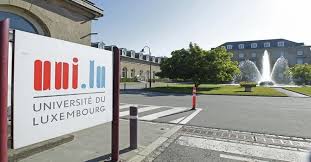The University of Luxembourg is an international research university with a distinctly multilingual and interdisciplinary character.
The Faculty of Science, Technology and Medicine (FSTM) at the University of Luxembourg contributes multidisciplinary expertise in the fields of Mathematics, Physics, Engineering, Computer Science, Life Sciences and Medicine.
Through its dual mission of teaching and research, the FSTM seeks to generate and disseminate knowledge and train new generations of responsible citizens in order to better understand, explain and advance society and environment we live in.
Your role
- Research in Arithmetic Geometry, Number Theory or Computer Algebra
- Teaching activity of 90 TU per year
- Active participation in and support of the organization of the activities of the research group
For further information please contact: Prof. Dr. Gabor Wiese (gabor.wiese@uni.lu), Tel: +352 46 66 44 5760
Your profile
- Research experience in Arithmetic Geometry, Number Theory, Computer Algebra or a related field
- Very good written and oral skills in English
- Knowledge of French and/or German is an asset
We offer
- Multilingual and international character. Modern institution with a personal atmosphere. Staff coming from 90 countries. Member of the “University of the Greater Region” (UniGR)
- A modern and dynamic university. High-quality equipment. Close ties to the business world and to the Luxembourg labour market. A unique urban site with excellent infrastructure
- A partner for society and industry. Cooperation with European institutions, innovative companies, the Financial Centre and with numerous non-academic partners such as ministries, local governments, associations, NGOs …
How to apply
Applications should include:
- Letter of motivation (or extended cover letter)
- Detailed curriculum vitae
- Research statement
- Names and email addresses of two referees
- Copies of the two most important papers (or of the PhD thesis)
- Scans of diplomas
Early application is highly encouraged, as the applications will be processed upon reception. To ensure full consideration, candidates should apply by 31 January 2025 ONLINE formally through the HR system. Applications by Email will not be considered.
All qualified individuals are encouraged to apply. In line with our values, the University of Luxembourg promotes an inclusive culture. We encourage applications from individuals of all backgrounds and are dedicated to upholding equality and respect for our employees and students.
General information:
- Contract Type: Fixed Term Contract 24 Month
- Work Hours: Full Time 40.0 Hours per Week
- Location: Campus Belval
- Internal Title: Postdoctoral researcher
- Job Reference: UOL07051
The yearly gross salary for every Postdoctoral Researcher at the UL is EUR 83099 (full time).
